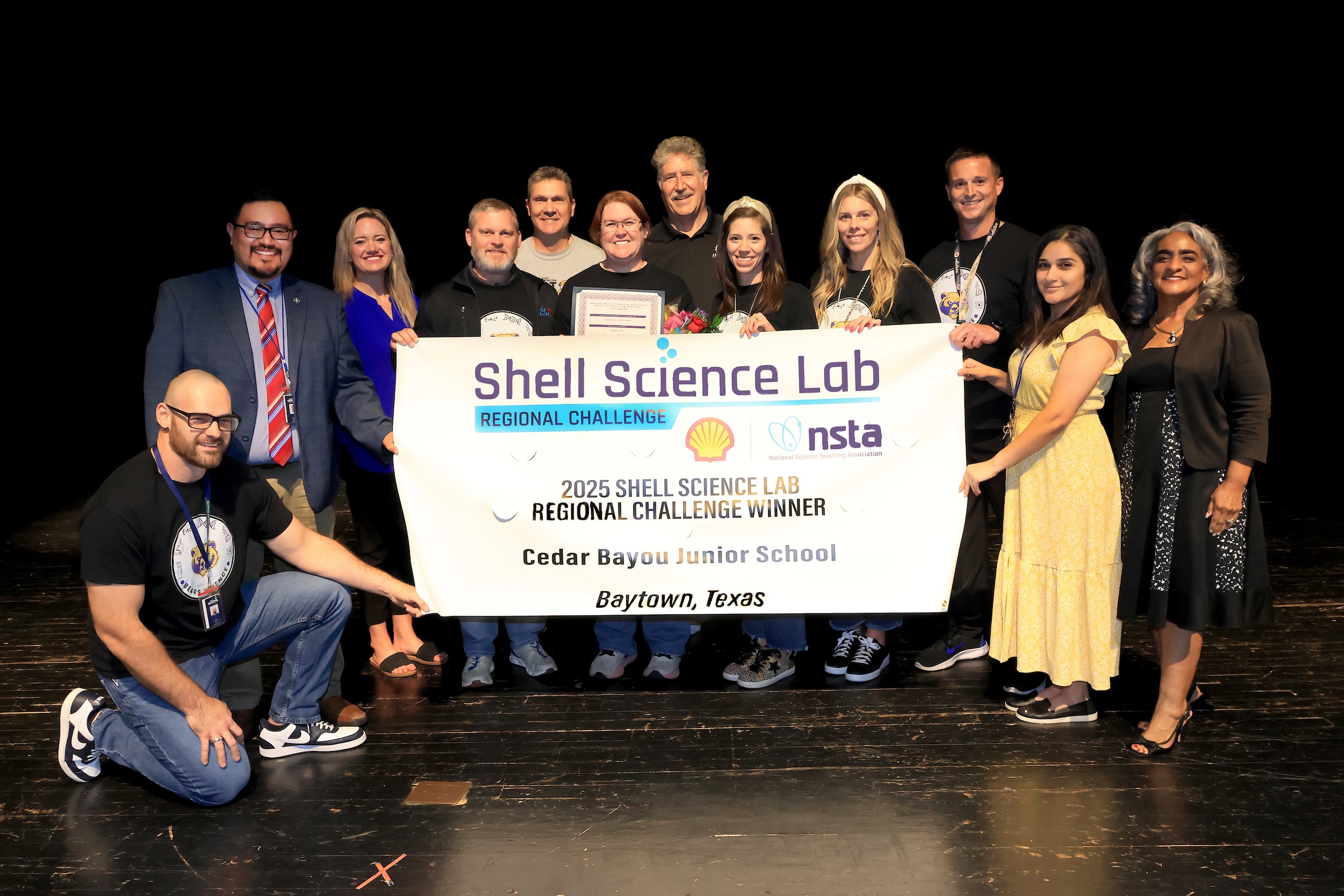26 Science Teachers Honored for Finding Innovative Ways to Deliver Quality Lab Experiences to Students
Baytown, TX—October 8, 2025—Margaret Cayton, science teacher at Cedar Bayou Junior School in Baytown, Texas has been named a regional winner in the Shell Science Lab Regional Challenge. Sponsored by Shell USA, Inc. and administered by the National Science Teaching Association (NSTA), the competition encouraged K–12 science teachers who have found innovative ways to deliver quality lab experiences with limited school and laboratory resources to share their approaches for a chance to win a school science lab makeover support package. Mrs. Cayton is one of 26 regional winners named, of which three grand-prize winners will be selected.

Pictured, from left, Damian Dunn, CBJ Science teacher, Dr. Roger Cardona, CBJ Principal, Stephanie DeLoss, GCCISD Science Instructional Specialist, Richard Rafuse, CBJ Science Teacher, Kevin Foxworth, GCCISD Area Executive Director, Margaret Cayton, CBJ Science Teacher and award recipient, Dr. Randal O’Brien, GCCISD Superintendent, Alexa Augustine, Kourtney Lavernge, Cade Augustine, Lauren Castro, CBJ Science teachers, and Karen Labat, Education Specialist, Workforce and Diversity Outreach at Shell. Photo by Carrie Pryor-Newman.
Margaret Cayton believes that science classrooms should foster an environment rich in active learning activities. This approach involves an intentional integration of hands-on labs, goal setting and analysis, critical thinking, and problem-solving exercises, all aimed at enhancing student engagement. Blending these elements creates a dynamic learning atmosphere that encourages students to explore, inquire, and develop a deeper understanding of scientific concepts. In Mrs. Cayton’s science curriculum, she prioritizes hands-on learning through inquiry-based practices, vocabulary development, and the establishment of connections to real-life contexts as well as interdisciplinary subjects. This multifaceted approach is designed to engage students actively and support their understanding of scientific concepts. While the laboratory classroom has some glass flasks and materials, many of these items have been damaged over the years, limiting the quantity available. The current setup necessitates lab activities arranged on the counters, which restricts the available space and hinders student interaction with the materials. Facilitating collaborative group work is essential for enhancing student learning. Mrs. Cayton’s goal is to foster an inclusive classroom atmosphere where students feel comfortable seeking assistance and participating actively. Upgrading to tables that accommodate group work would allow all students to engage simultaneously, eliminating the need for turn-taking. This enhancement would also enable Mrs. Cayton to prepare labs in advance, maximizing the time available for conducting experiments during class.
“These conscientious and creative science teachers have overcome many obstacles associated with having limited resources to provide their students with high-quality lab experiences,” said Dr. Beverly DeVore-Wedding, NSTA President. “We commend these regional winners for their ingenuity and their dedication to their students.”
To enter the Shell Science Lab Regional Challenge, K–12 science teachers located in select school districts near Shell assets were asked to describe their school’s current laboratory resources, explain why laboratory upgrade support is needed, and outline their approach to science education instruction using their school’s current lab facilities. A panel of science educators then reviewed and selected the top entries. The regional winners each received a school science lab makeover support package valued at $15,000 (for the elementary level) and $20,000 (for the middle and high school levels).
Mrs. Cayton now advances to the national phase of the competition, where they will have a chance to win an additional $5,000 in support to attend a future NSTA National Conference. All national winners will be honored during a special evening celebration during the conference.
For more information about the Challenge, visit the competition website at https://www.nsta.org/shell-science-lab-regional-challenge.
About NSTA
The National Science Teaching Association (NSTA) is a vibrant community of 35,000 science educators and professionals committed to best practices in teaching science and its impact on student learning. NSTA offers high quality science resources and continuous learning so that science educators grow professionally and excel in their career. For new and experienced teachers alike, the NSTA community offers the opportunity to network with like-minded peers at the national level, connect with mentors and leading researchers, and learn from the best in the field. For more information, visit https://www.nsta.org/, or follow NSTA on X, formerly known as Twitter; Facebook; Instagram; YouTube; and LinkedIn.